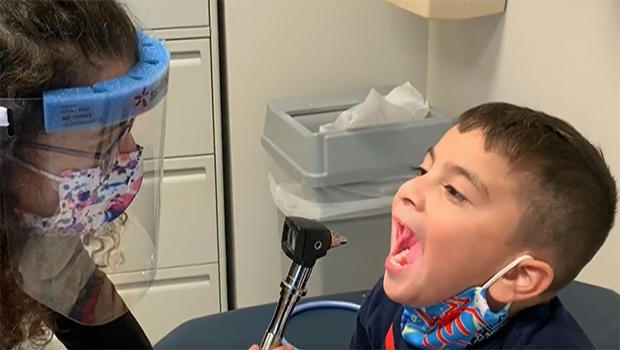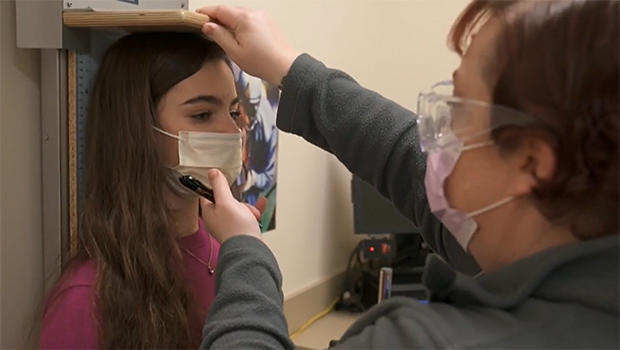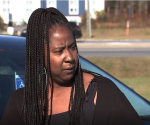How are long-haul COVID symptoms affecting children?
[ad_1]
At first glance, it’s hard to believe Aaron Estrada is anything other than a healthy 4-year-old, but it has taken a year for the energetic little boy to get here.
In November 2020, Aaron was in a hospital bed for more than a week, requiring oxygen to breathe, after contracting COVID. His hair started falling out, he had heart problems, and he couldn’t walk or stand for a month.
Correspondent Meg Oliver asked Aaron, “Do you remember, after you got sick, how it made your legs feel?”
“Bad,” he replied.
He developed a severe COVID-related life-threatening condition called multisystem inflammatory syndrome in children, which causes major organs to become inflamed.
Oliver asked Concepcion Ruiz, Aaron’s mother, “What was going through your mind?”
Crying, Ruiz said, “Very sad, emotional.”
CBS News
A recent U.K. study found that COVID still affects one in seven kids months after infection. One study of long COVID symptoms in children suggested that more than half of those between 6 and 16 years old who contract COVID have at least one symptom that lasts more than 120 days.
Dr. Katharine Clouser, at Hackensack Meridian Health in New Jersey, says her pediatric hospital has seen an increase in the number of kids with long-hauler symptoms. She and her team opened one of the first pediatric COVID recovery centers in the state last spring, to help Aaron and other kids like him.
When asked to describe long-hauler symptoms, Clouser said, “In children, we tend to see that they have persistent fatigue. Some kids are having persistent headaches, and a lot of kids are having anxiety symptoms that maybe they didn’t have before.”
A recent study found young people with pre-existing conditions (such as chronic kidney disease, immune disorders or heart disease) are 25 times more likely to get severe COVID than those without.
But Aaron Estrada had no known pre-existing conditions – nor did 14-year-old Madison Foor from Michigan. “It feels a little scary, like I just can’t breathe,” she said.
Madison is a competitive dancer. She was healthy and thriving before she got COVID in January. She never used an inhaler before, but 10 months later, she still needs one, and gets winded easily, especially while dancing.
“I get really tired, and I need to sit down, and my heart starts pumping really fast and my lungs – just like [a] constant need for air,” she said.
CBS News
Her mother, Mariha Lyn Foor, said, “I’m worried about, this could have done more damage than what we even realize. But I’m also worried that she’ll also need the inhaler for the rest of her life to do things such as take long walks, or bike rides, or need it for dance.”
As for Aaron, doctors are hopeful that with time and continued treatment, he will make a full recovery.
Oliver asked Aaron, “What do you want to say to your doctors who helped you learn to walk again?”
“Gracias,” he replied.
Children are eligible for the Pfizer vaccine once they turn five years old. The CDC estimates, so far, about 900,000 children in the U.S. between ages five and 11 have received their first dose of the COVID vaccine.
While Aaron won’t turn five until this spring, his doctor wants him to get the shot this month given how severe his reaction to COVID was.
His doctor told “CBS Mornings” she hopes the vaccine will help decrease long-haul cases, and there is already some evidence it’s reducing long-hauler symptoms in kids like Aaron.
Download our Free App
For Breaking News & Analysis Download the Free CBS News app
[ad_2]
Source link












